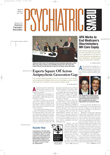Suppose you had a parent who had Alzheimer's disease. What is your genetic risk of developing the disease? Although the crystal ball that can answer this question is not available, a study reported in the May Archives of General Psychiatry may offer some clues.
The study, whose lead author was Jeremy Silverman, Ph.D., a professor of psychiatry at Mount Sinai School of Medicine in New York, included some 900 individuals with Alzheimer's, about 4,700 of their first-degree relatives, about 1,500 elderly persons without Alzheimer's, and approximately 7,700 of their relatives.
Silverman and his colleagues identified the age of the Alzheimer's subjects at the time they developed the disease and the age of the nondemented elderly subjects at the time of the study. They also determined whether any relatives of the Alzheimer's subjects or any relatives of the nondemented elderly subjects had Alzheimer's, and if so, when they had developed the illness.
People with a first-degree relative with Alzheimer's, Silverman and his co-workers found, are at the highest genetic risk of developing Alzheimer's themselves if their relative got Alzheimer's in his or her 60s and if the individuals themselves are currently in their 60s. If their relative got Alzheimer's at a later age and they are young, then their genetic risk of Alzheimer's is less. Or if their relative got Alzheimer's in his or her 60s but they are older, then their genetic risk is also less. On the whole, their genetic risk drops sharply as their relative's age at Alzheimer's onset and their own age increase.
Thus, “the results provide evidence that in relatives of probands with Alzheimer's, the role of genetic risk factors steadily decreases with increased age and as the onset age of the proband with Alzheimer's increases,” the researchers concluded.
The findings can also prove useful to clinicians working with family members of Alzheimer's patients who are concerned about their own risk, Silverman told Psychiatric News. For example, he said, “It is very well documented in incidence studies of Alzheimer's that Alzheimer's overall is still fairly rare for people in their 60s. But if you are a relative of an Alzheimer's proband and the proband's onset was relatively early, then your risk is many times increased at this age compared with relatives of nondemented elderly.”
Indeed, the study's findings have “tremendous clinical applicability,” Debby Tsuang, M.D., an associate professor of psychiatry at the University of Washington, said in an interview. In both her research and clinical practice, Tsuang has many older patients who have either a parent or another relative with Alzheimer's and who want to know their risk for developing the illness. She plans to use data from this study to help her evaluate their risks, she said.
Silverman and his team likewise intend to use their results as a springboard for additional Alzheimer's studies. For example, although their findings indicate that genetic risk factors play a very small role in Alzheimer's susceptibility among very old people, this is the age group most likely to get Alzheimer's.
Thus nongenetic factors explain most late-age susceptibility to the disease, the researchers suspect, and they will be studying the very old to identify such factors. “We are especially interested in the potential role of cardiovascular risk factors in this group,” Silverman said.
The study was funded by the National Institute on Aging and the New York Community Trust.
Arch Gen Psychiatry 2005 62 565
